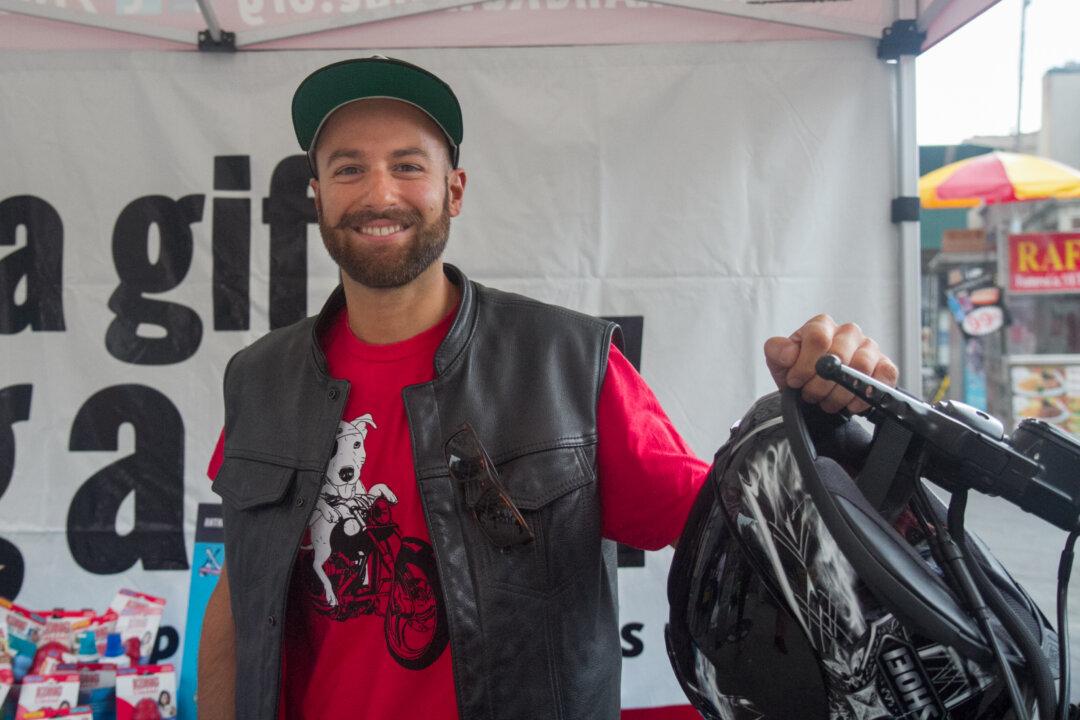NEW YORK—After eight years of serving with the U.S. Marine Corps—including a deployment to Fallujah, Iraq, in 2004—Anthony L. Ungaro was having a difficult time adjusting back to civilian life. He was suffering from PTSD (post-traumatic stress disorder), and unable to get help for it. When he came across an article about animal shelter pets and their ability to provide companionship, he decided to take a leap of faith.
“There was not much to lose at that point, so I thought, why not?” Ungaro adopted a red-nosed pit bull at a local shelter in New York City. He named him Donny.
That was two years ago. Ungaro said adopting Donny has changed his life. “I’m applying to medical school. I don’t think I would’ve been able to do it without him.”
Now, Ungaro, a just graduated pre-med student from the New York Institute of Technology, is preparing to go on a 4,000-mile motorcycle tour across the country to bring supplies to animal shelters and raise awareness about adopting animals from shelters. He sets off with his Harley Davidson bike this Wednesday, stopping in four cities: Detroit, Mich.; Rapid City, S.D.; Midvale, Utah; and Los Angeles, Calif. He expects to arrive in California by Aug. 14.
Partnership
Ungaro partnered with a local animal charity organization, Rock & Rawhide to pick the cities that need the most help.
Some shelters don’t have enough resources and are forced to euthanize animals that they cannot provide for. If more people adopt pets from shelters, it’s less likely that they will be put down, Ungaro said.
According to the latest data from the Animal Care & Control of New York City, a nonprofit contracted by the city to care for abandoned animals, 4,843 animals were euthanized in 2013. This is down from nearly 24,000 in 2004.
“You’re saving a life. It’s an added reward,” Ungaro said. Donny was a dog that was to be euthanized at his shelter. “I’ve had dogs in the past, but there’s a big difference. Donny is very appreciative because he was rescued.”
Ungaro will be bringing pet food, treats, chew toys, and other supplies donated by sponsors to animal shelters. The toys can keep animals preoccupied and in a calmer state, so that people are more likely to adopt them. Rock & Rawhide, which collects these toys for distribution to local animal shelters, calls it “distraction therapy.”
“Animals don’t want to be in a shelter. They want to be in a loving home,” said Alexander Silver, communications associate at Animal Care & Control.
“If they’re chewing on a kong [dog toy], adopters see a happy animal, not an animal anxious to get out,” she said. The organization takes in an average of 30,000 animals per year at its five shelter locations. She says most are cats and dogs that people find on the streets, or that owners surrender because they can no longer care for their pets due to financial or health reasons.
Ungaro is grateful that he was able to overcome his PTSD. “It’s something that will never go away,” he said, “but I felt it decline through adopting a shelter pet and from my family’s support system.”
For other veterans who are having a more difficult time coping, Ungaro recommends that they try adopting a pet. “It will definitely improve your life, without a doubt.”
Additional reporting by David Ahern





